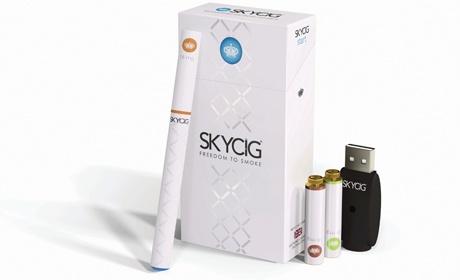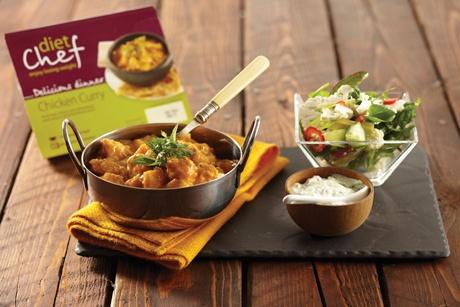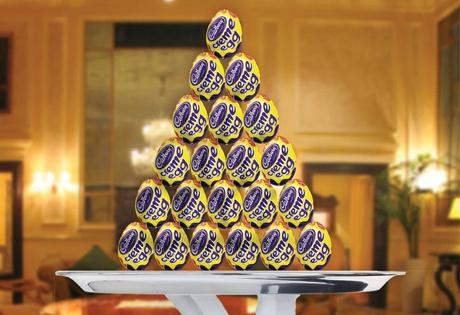The future of food and drink marketing
As the National Obesity Forum issues a stark warning about the poor state of the UK’s health, some food and drink brands are adapting their marketing to encourage healthier lifestyle choices while remaining appealing the consumers.
“Brands that make sugary and fatty foods are in danger of becoming the new tobacco companies,” warns Richard Cope, senior trends consultant at Mintel, referring to the stigma now associated with smoking and the tobacco industry that supports it.
“Recommendations from scientists, nutritionists and governments are not going away,” he says. “The smart brands realise that ‘fat taxes’ are effectively coming.”
The clamour for change in the food and drink industry has reached fever pitch. To coincide with the Government’s new ‘Change4Life’ marketing push, the National Obesity Forum warned in early January that a previous forecast that 50 per cent of the UK population will be obese by 2050 does not reflect “the true scale of the problem”.
And this week, Channel 4’s Dispatches programme suggested that the food industry has increased the quantity of sugar in products, although the Food and Drink Federation says that sugar, when consumed as part of a balaned diet, does not cause obesity.
The forum’s call for tougher action came days after a group of influential doctors demanded a cut in the sugar content of food and drinks of up to 30 per cent, warning that sugar is now as dangerous to health as tobacco and alcohol.
Public health debates are commonplace in January as lobby groups target consumers obsessed with detox, diets and New Year’s resolutions. But the attacks on the food industry are also part of a longer-term trend rooted in rising concerns about obesity levels in developed economies around the world. Brands face the challenge of responding sensitively and responsibly while retaining their value to consumers.
“At the moment we’re seeing brands trying to stay ahead of the curve or at least be seen to give consumers a healthy choice,” says Cope.
To coincide with the current New Year period, fast food chain Subway is pushing its healthier menu options in its advertising, while Heinz has just launched new packaging for its Reduced Sugar and Salt Beanz range to flag up the offering. But not all food brands[1] have followed the same tack. Takeaway pizza brand Domino’s, for example, states that it would be wrong for it to change its proposition to consumers.
So far, 38 businesses have signed up to calorie-reduction pledges through the Government’s ‘responsibility deal’, which also includes restrictions on marketing to children. As examples of its success, the Department of Health reports that Mars has reduced its single chocolate portions to no more than 250 calories and that Tesco has decreased the cumulative number of calories sold in its own-brand soft drinks by over one billion.
We think we can create an environment where people can still enjoy the products while knowing the limits and how to better live their lives
Meanwhile last year, Coca-Cola was jolted into engaging in the obesity debate in its advertising following damaging publicity in the US. The company ran a campaign promoting its record of making low-calorie drinks and ran an advert showing different activities that equate to burning off the 140 calories in a regular can of Coke.
Ian Twinn, director of public affairs at advertising trade body ISBA, agrees that encouraging people to change their lifestyle is more important than placing new restrictions on brands.
He argues that all brands can follow Coke’s approach and support a healthy lifestyle message while continuing to promote their products.
“We think that if we can work properly with NGOs [non-governmental organisations], Government and business we can, over the long run, create an environment where people can still enjoy the products while knowing the limits and how to better live their lives,” he says.
“All our members who are advertising foods are well aware of the debate and know what they can achieve and can’t achieve. If there is an environment that encourages them to work together with Government, they’ll do it. But if they’re going to be slagged off and vilified, they won’t do it. This government gets it – but some of the NGOs don’t.”
ISBA member Mondelez, which is also signed up to the responsibility deal, says its role is to encourage ‘balanced snacking’ through a range of measures. “All our products can be enjoyed as part of a healthy, balanced diet,” says a spokesman.
The food industry could potentially learn from the alcohol sector, where certain brands have sought to counter Government pressure over excessive alcohol consumption by promoting moderation as a lifestyle choice.
This includes drinks giant Diageo, which partnered with Transport for London (TfL) for the third consecutive year in December to advertise a responsible drinking message over the festive period. The campaign included sponsoring free travel for TfL users on New Year’s Eve.
Such activity is partly down to the health concerns surrounding alcohol, including rising incidences of liver disease and alcohol’s role in causing obesity. But it also reflects attempts by drinks companies to move beyond their products and reposition themselves as lifestyle brands, particularly as alcohol consumption among young people falls.
A study last year by the Institute of Alcohol Studies found that in recent years, alcohol consumption levels among young people have fallen below the UK average.

Heineken’s ’Dance More Drink Slow’ campaign aims to make moderate drinking “an aspirational behaviour” by showing that people can better enjoy a night out when they stay in control
Part of brands’ repositioning has therefore involved a greater emphasis on content and storytelling. This month, for example, Absolut Vodka revamped its website in order “to be more content-rich to ensure fans are presented with leading trends and collaborations” in areas such as music and fashion. Localised versions of the site have been released across Absolut’s markets to provide a mixture of global and country-specific content.
The brand’s detachment from the alcohol product is also reflected in parent company Pernod Ricard’s decision to axe the ‘Vodka’ text from Absolut’s logo. The new logo appears on all marketing assets with the exception of the bottle itself and is designed to “simplify, unify and amplify the brand’s messaging platforms, allowing the editorial team to tell a wide range of stories”.
Similarly, Heineken is using its ‘Enjoy Heineken Responsibly’ (EHR) positioning to appeal to young people through different content and lifestyle activations. The brand has partnered popular Dutch DJ Armin van Buuren to create the ‘Dance More, Drink Slow’ campaign – launched this month – which aims to make moderate drinking “an aspirational behaviour” by showing that people can better enjoy a night out when they stay in control.
Van Buuren has written a new track for the campaign called ‘Save My Night’ and Heineken has released a TV advert as well as an online video titled ‘The Experiment’ that focuses on two separate nights in the same club where the only difference is the DJ. The film is intended to demonstrate that a good DJ can help consumers to change their behaviour simply by encouraging them to dance more and consequently drink slowly.
Although it might seem counterintuitive for an alcohol brand to tell people to drink less, Heineken believes it is vital for tackling the problem of excessive alcohol consumption. The company is pushing its moderation message to the fore this year by also re-running ‘Sunrise’, a TV advert first aired in 2011 that conveys the message: “There are no limits when you know your limits.” In total, Heineken plans to spend 10 per cent of its media budget for 2014 on EHR activations.
You don’t need to drink a lot to have a good time so moderation is fundemental to the way we think about business
“Seeing someone who has had excessive alcohol is not good for business,” says Anuraag Trikha, Heineken’s global marketing communications manager. “As a premium lager brand, we always recommend that our consumers choose quality over quantity. The outcome is that you don’t need to drink a lot to have a good time, so moderation is fundamental to the way we think about business.”
Trikha adds that Heineken aims to “make moderation cool” for young consumers by working with people like Van Buuren and by ensuring its message is empowering.
“We saw that the people who were talking about this topic were either governments or the media and the language they were using was all in the context of what not to do,” he says. “That is quite demotivating for the people you are targeting.
“Heineken believes that alcohol in moderation is a way of maximizing opportunity for young adults and not the other way around.”
Weight-loss brands are also seeking to convey positive messages about the subject of moderation in order to attract consumers during the New Year period. For example, Diet Chef highlights the fact that subscribers to its service can eat a varied range of foods without having to count calories. The company delivers healthy ready-meals to customers and keeps track of their calorie intake for them.
“With us you can eat curries, pies and pastas,” explains Izzy Cameron, partnership manager at Diet Chef. “People don’t have that sense of deprivation where they feel they can only eat lettuce leaves. There’s such a breadth of options that people find they eat a wider range of food than they normally would.”
The brand’s New Year campaign is designed to showcase these food options, as well as the convenience factor. Its current TV advert shows a woman going about a normal day and occasionally stopping for meals without having to worry about her diet plan. The brand is also sponsoring selected programmes on Scottish channel STV as part of the New Year campaign.
“The whole concept is around numbers and the fact that we’ve done the hard work in terms of the calorie count and portion control for you so that you can just get on with everything else,” says Cameron.
This tactic of positive reinforcement is common among health brands[2] that aim to ‘nudge’ consumers into changing their behaviour. While some brands employ rewards, incentives and support services in order to encourage behaviour change, others are drawing on the host of new apps and online services that enable people to monitor their own behaviour and adjust it accordingly.

Müllerlight uses a sense of humour to support people’s efforts to lead healthier lives through its ‘Mondays’ drive
In November, the Government announced the launch of a number of new apps designed to tackle obesity and alcohol abuse. The apps, developed with small businesses as part of a £2m innovation fund, include Drink Coach, which allows people to track their drinking over an evening and sends prompts to their phone reminding them to slow down. Smartphone game The Walk, meanwhile, encourages players to walk 10,000 steps every day.
Richard Cope at Mintel believes that ‘self-analysis’ is a growing consumer trend that will further encourage people to live healthier lives. He notes that with the advent of wearable technology like Nike Fuelband, Google Glass and smart watches, consumers are “getting closer to our bodies and closer to what they ingest”. With this proliferation of data, people can monitor what they consume in increasingly greater detail, he suggests.
“People are becoming more aware that their data is a currency,” says Cope. “I think we’re heading to a scenario ultimately where you will get opt-in services so that if I shop in Tesco every month, I can ask Tesco ‘How many calories am I buying?’ or ‘How much Omega 3 am I buying?’”
This quest for more data, combined with Government action against obesity, is placing new responsibilities on food and drink brands. Last summer, the Government announced that a new ‘traffic light’ system for providing nutritional food labelling will be rolled out across all of the UK’s major supermarkets following several years of development.
Meanwhile later this year, new EU food and drink labelling legislation is intended to target brands that are deemed to have ‘high caffeine content’ by requiring them to display additional caffeine labelling if caffeine is added for a ”physiological effect”.

Skycig times marketing drives with consumers’ resolutions to stop smoking
More punitive measures have also been trialled, but with limited success. Last year, for example, the New York board of health passed a law banning the sale of large sugary drinks in restaurants. Although the law was blocked after the courts deemed it unconstitutional, the health authority has hinted that it may try to push the ban through again this year.
Cope believes these actions are part of a gradual creep of measures and restrictions against food and drink brands that will seep into the public consciousness as the obesity debate continues to grow. He argues that brands must adapt to the changes if they are to avoid the same stigma now attached to tobacco companies.
“The legislation hasn’t really happened yet – but it’s going to,” says Cope.
“At the moment, consumers don’t want a nanny state clamping down on their freedoms, but that will change once people start to feel that they’re subsidising the lifestyles of other people by having to pay to treat them in hospital.
“That’s what happened with smoking.”
Healthy New Year campaigns…

Evian has developed a brand identity synonymous with youth and vitality thanks to its popular ‘Live Young’ campaign and the ‘dancing babies’ that inhabit it. This month the brand has extended the theme for ‘Live Young January’: an interactive campaign that asks UK commuters to tap into their inner child and banish the back-to-work blues.
While the campaign does not have a specific health message, Evian senior brand manager Sophie Brooks confirms that January is a key consumption period for bottled water and thus a busy one for marketing. The campaign is backed by in-store promotions across 10,000 point-of-sale units and 2,000 displays in the UK and Ireland, as well as print and outdoor ads.
“Instead of focusing on denial, Evian’s ‘Live Young’ spirit is about injecting fun and positivity into January and kicking off the new year in a more upbeat frame of mind,” says Brooks.
Yoghurt brand Müllerlight is also seeking to inject an element of fun into its marketing activity with the launch of ‘Müllerlight Mondays’: an online competition platform that invites consumers to sign up for a chance to win prizes at the beginning of every week. Those who sign up also receive a weekly newsletter featuring beauty advice and diet information.
Michael Inpong, Müller Dairy marketing and R&D director, reports that in January 2013 the Müllerlight brand recorded its highest four-week period of sales for over three years, selling over 40 million pots and taking £15 million.
“It’s a great time to start the new year right and a strong January, filled with exciting new product development and innovative marketing activity, really helps to push the momentum of our brands and propel us into an exciting year ahead,” says Inpong.
The e-cigarette sector has also increased its marketing activity in an attempt to appeal to people with a New Year’s resolution to give up smoking. Njoy has launched an advertising campaign that calls on people to help their friends stop smoking this New Year, while Skycig is running discount promotions on its site to encourage people to trial the technology.
Skycig digital marketing manager Mike Thompson says the company has developed its own internal guidelines in the absence of clear advertising regulations for the sector at present. The brand will turn to social media in late January to support its New Year campaign.
“We find that word of mouth is by far the best traction gain for us and gives us a fantastic rate of retention, so we’ll be leveraging our audience towards the end of the month within social media to stimulate some conversations from people who have started resolutions,” he says.
…Not-so healthy campaigns

According to Marketing Week sources, brands selling foods that are high in fat and sugar tend to reduce their advertising spend during January to account for the New Year consumer climate. The reasons for such restraint are not necessarily clear-cut, however, and not all brands follow the same strategy.
“In my experience, there is always a drop,” says one media agency source. “Reasoning is in part based on ‘healthy January’ but also in part to do with not having budgets sorted and assessing Christmas sales.”
Takeaway pizza brand Domino’s states that rather than adjusting its marketing to account for the health-conscious in January, it runs promotions for people looking to save money after the expensive festive season.
“For us, January is much more about offering our customers great or abundant value at a time of year when we know their wallets will be under pressure after Christmas,” says Nick Dutch, head of digital marketing at Domino’s.
“We know that for most of our customers, pizza is a treat and therefore changing our product or overall proposition isn’t appropriate. We just want to make sure our customers can treat themselves if they want and know they are getting the best deal possible from us.”
Meanwhile, rather than rein in its advertising this January, United Biscuits (UB) is launching a major £12m marketing campaign at the end of the month that will see it bring all its sweet biscuits under the McVitie’s brand. UB says the change is part of a “focused and integrated programme of marketing initiatives” aimed at increasing the size of the business from £400m in retail sales to £600m within five years.
Dunkin’ Donuts has also ramped up its marketing activity in the UK through a two-year sponsorship deal with Liverpool Football Club that will see its logo appear throughout the club’s stadium and grant it rights to serve snacks on match days.
Phil Rumbol, former marketing director at Cadbury, confirms that January is still a busy period for certain snack and confectionery brands. Rumbol, who is now founding partner of marketing agency 101 London, notes that marketing for Cadbury Creme Egg always begins in January in order to give it exposure in the run-up to Easter.
For other variants, however, he confirms that snack brands tend to spend more conservatively in January. “In addition to the detox trend, you have to remember the carry-over from Christmas,” he says. “People’s in-home stocks of things like chocolate tend to already be quite high in January.”
References
- ^ not all food brands (www.marketingweek.co.uk)
- ^ common among health brands (www.marketingweek.co.uk)









